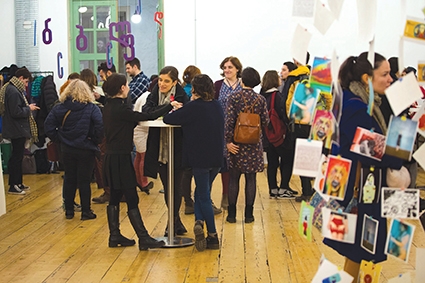Exhibition ‘Passions & Rights’ Held against Gender-Based Violence
Over the years, the number of crimes and cases of violence against women as well as discrimination and oppression on grounds of sexual orientation and gender identity have been seen worldwide. Georgia is one of those countries that still faces many problems and forms of violence both in families and in society. For the majority of the population, it is still difficult to understand that sexual rights are a component of human rights and contribute to the freedom, equality and dignity of all people. Every year from 25 November, the International Day for the Elimination of Violence against Women, to 10 December, Human Rights Day, the ‘16 Days of Activism against Gender-Based Violence Campaign’ aims at ending the violence against women and girls around the world.
To mark the occasion, on December 8-9, the exhibition Passions and Rights was held by Georgia’s Women's Initiatives Supporting Group (WISG) at Fabrika, Tbilisi. 16 works by local artists were selected based on 16 principles of the Declaration of Sexual Rights within the 16 Days of Activism. The works by contemporary Georgian artists were made in different forms of visual media (photo, painting, collage, etc.) and interpreted sexual rights from different aspects: reproduction, repressed sexuality, early marriage, sexual education, identity and self-determination.
Each artwork was accompanied by an article from the Declaration in order to better transfer the message to the public.
“We wanted to discover new faces and artists to collaborate with them in the future,” Natia Guliashvili, Media Officer at WISG told GEORGIA TODAY. “This time the competition comprised only Georgian artists. We join the international campaign annually in different ways. In the past we held an online campaign on social media that aimed at revealing those stigmas and forms of violence that are most common in our society.”
At the end of the evening, three winners were revealed and awarded, yet all the participants received symbolic prizes from the organization. Georgian artists Maka Zedelashvili, Anuk Beluga, and Mariam Gabrichidze came in the first three places.
“The competition was about women’s rights, something that is crucial to me,” first place winner Maka Zedelashvili told GEORGIA TODAY. “This is a theme that I have thought about many times. Almost all my works over the past three years have evolved from this issue. I dedicated two personal exhibitions to women’s rights. I wish we could bring real changes in this direction through different forms of art. I came up with two artworks at the exhibition. The first one, called ‘Identification/ Eldorado’ is about Muslim women who are wearing colorful dresses under black clothes. I once saw a video where the Muslim women demonstratively took off their black clothing and showed their colorful dresses. This show was impressive and simultaneously shocking to me, since this action could put their lives in danger. Still, these women were brave enough to express their identities. I perceived it as the highest form of protest and expression of oneself. I thought about that for a long time and painted Muslim women in Voltaire’s world. It is a utopian world, like a paradise on earth. I intended to show the contrast between the two worlds, our reality and a nonexistent world,” she said.
Her second painting at the exhibition was about female genital mutilation, a centuries-old tradition that is still actively exercised in three villages of Georgia. “When I discovered this ritual is still observed, I was shocked. I know one painting is not enough to highlight this problem to society and I’m planning to create more works addressing this issue,” the artist told us.
“The exhibition gave the artists the opportunity to think about rights and express them through visual art,” said Eka Tsereteli, WISG Director. “Within the contest out of 50 works, 16 participants were selected that symbolically coincide with 16 days of campaigning and the articles of the Declaration. We had an installation of torn school books, demonstrating that often teachers at Georgian public schools skip the themes related to anatomy and sexual studies, too ashamed to talk about the topics and subsequently making them taboo subjects,” she said. “Most of the works here express oppression and the struggle for one’s rights. Rights are not priviledges to be earned but part of what is means to be human.”
The Women's Initiatives Supporting Group was founded in 2000 by eight women of different professions, their main goal being to support the formation of a harmonious society based on principles of social justice by empowering women, which ensures the full involvement and equal participation in social, political, cultural and economic life for all women.
By Lika Chigladze











